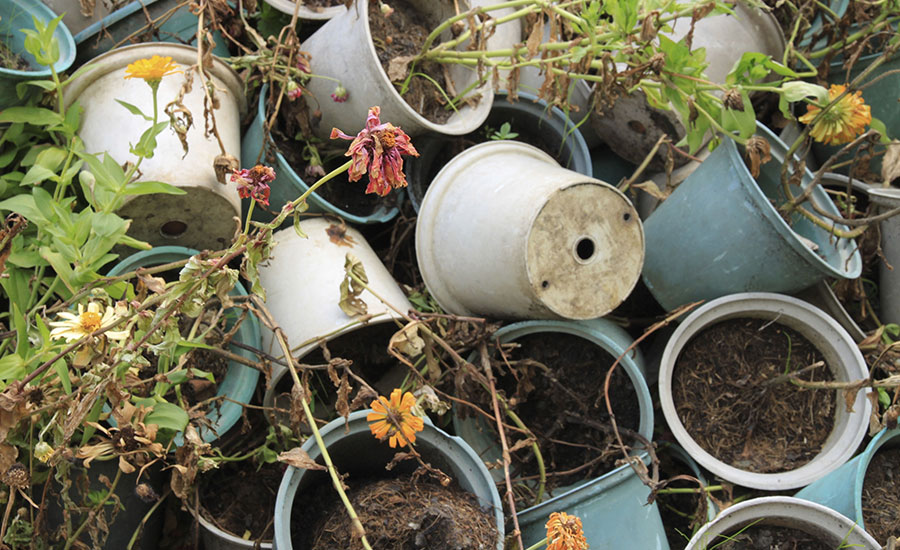Ditch The Holiday Blues
If you’ve returned from your holiday to pots of wilted plants, tired vegetable plots and bedraggled borders, Hannah Stephenson has some advice
Gardeners who went on holiday confident that friends and family would water, deadhead and harvest their crops in their absence must be feeling pretty smug.
But what about those of us who didn’t have the luxury of a mate to water the garden while we were sunning ourselves elsewhere? What about those who just didn’t find time to install an automatic irrigation system?
Well, you now have to look at the mess that remains and consider what’s worth saving and what isn’t.
Annual bedding plants in containers and baskets are unlikely to recover fully if the weather’s been scorching and they’ve been left in the sun, so it might be a case of taking an executive decision, tipping them out and starting again.
Plants such as lobelia and soft, fleshy plants including fuchsias and tomatoes are much less likely to survive than drought-tolerant plants such as pelargoniums.
You may find a few bargains of late summer blooms in your local garden centre to brighten up the scene, but if you’re on a budget it’s probably better to invest in some spring bulbs for planting, or get a head start on autumn and winter planting designs.
If you’re not going to use your containers for winter displays, clean them out, wipe them down and put them away. Don’t leave terracotta pots out for pests like slugs and snails to hide under. If you leave them out too long, they’ll just crack when the frost comes too.
Containers holding year-round-interest plants such as shrubs or evergreens may benefit from being submerged in a bucket of water to re-wet the compost, but it is difficult to tell if the compost is thoroughly soaked and it is important not to waterlog the plants.
After re-wetting, robust architectural plants such as phormiums and box can be lifted out of their containers with their root system intact so you can see if the compost has been completely soaked through.
Clematis in containers are more likely to survive a week without watering if they are in big pots and have other plants around them, says world famous, award-winning clematis specialist Raymond Evison.
“If a clematis is in a pot 2ft in diameter and 2ft deep it should survive well. Those in smaller containers, say 15in in diameter and 18in deep, will suffer some damage after a week of really hot weather with no water. Place other plant material around it in the pot, which will create a micro climate so that the clematis has a cooler root system.”
After a week with no water, the clematis will look pretty sorry for itself and new growth is likely to have shrivelled up. Give it a good soak, trim it down to around 18in and give it a feed with tomato or rose food and it should come back and may even flower again in October.
Border perennials and shrubs are much more likely to survive your absence, but if you have overgrown weeds on your return, pick them out to stop them shedding seeds which will cause you problems later. Deadhead all your border plants and give them a good water and they should recover.
Continue to deadhead roses and cut back finished summer-flowering perennials, removing supports which propped up the plants which have stopped flowering. These can be cleaned with a mild detergent and put away until next year.
If no-one has picked your crops, you are likely to come home to a large amount of stringy, tough runner beans which will need to be put on the compost heap, and the plants will probably have stopped flowering. Pick all the beans off the plants, give them a feed with a tomato feed and they may start producing again.
Dig up other vegetable plants which have succumbed to the prolonged hot weather, clearing vacant rows and refilling them with autumn and winter crops as soon as you can.
Some gardeners can become more relaxed about pest and disease control once they’ve had their two weeks holiday, but ignore them at your peril – you may be storing up problems that will remain dormant until next year. Cut off or prune out affected parts of diseased plants and burn or dispose of them so that overwintering spores won’t survive.
Pest control is also important. Be aware that many biological controls become less reliable when the temperature drops as the predatory insects which provide the control then multiply more slowly. Take off shoots on plants which are infested with greenfly or blackfly and dispose of them.
If you’ve been one of the unlucky ones whose plants seem to have had it this summer, don’t worry – you can steal a march on autumn and winter schemes which should keep the garden looking good later on in the season.
Latest posts by Sally - Silversurfer's Editor (see all)
- Do you eat a chocolate digestive with the chocolate facing up or down? - April 24, 2025
- More to explore: A life positive journey after 50 - April 24, 2025
- Do you snore? - April 24, 2025
- UK ban on EU cheese and meat: What it means for you - April 19, 2025
- Would you support personalised health MOTs at retirement age? - April 19, 2025




















